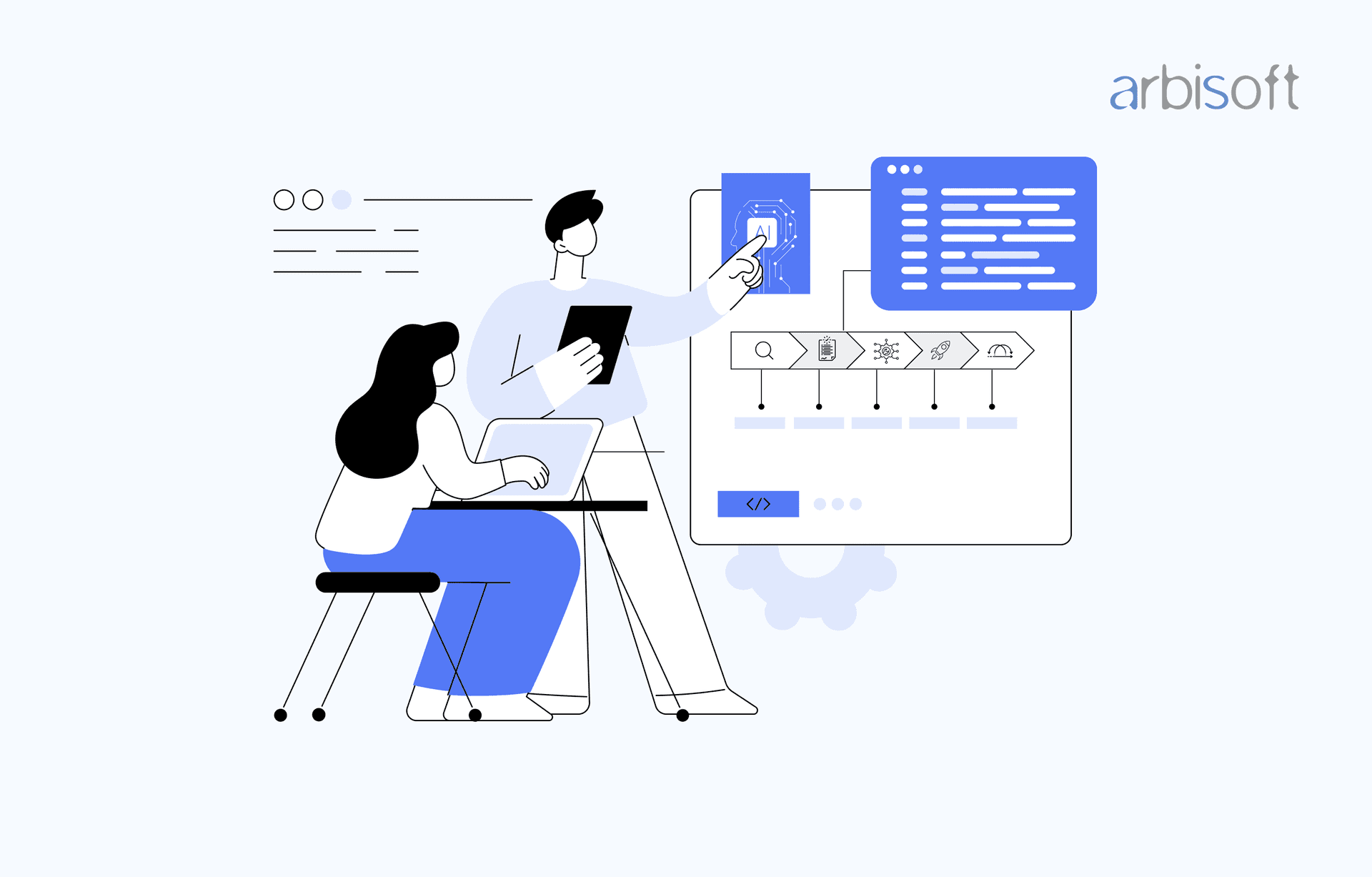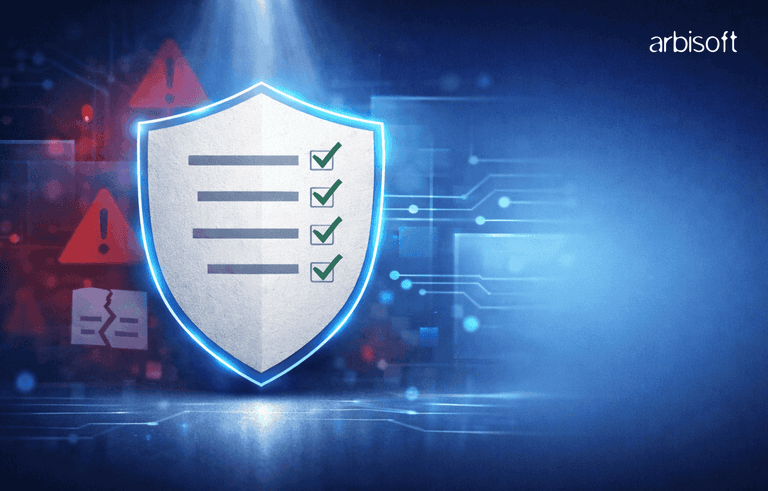We put excellence, value and quality above all - and it shows




A Technology Partnership That Goes Beyond Code

“Arbisoft has been my most trusted technology partner for now over 15 years. Arbisoft has very unique methods of recruiting and training, and the results demonstrate that. They have great teams, great positive attitudes and great communication.”
Product Lifecycle Management in the Age of AI

No one said product lifecycle management was easy, but surely concept and design weren't supposed to take this long.
And that's just the first step! Is each stage of the Product Lifecycle Management (PLM) going to be an uphill battle? Are we destined to grind away hours, weeks, and months trying to implement everything from prototyping and quality checks to troubleshooting and deployment?
Thankfully, no.
Even though it may be the most overused abbreviation in the industry right now, AI can save us all a lot of grief by improving and automating processes of PLM like never before.
But how does it actually do that? What can you expect to gain from it? And there's no such thing as a free lunch, so what's the catch?
We'll answer all this, and more, in today's blog. So let's dive in.
So, What is Product Lifecycle Management?
Product Lifecycle Management is a strategic approach to managing a product's journey from inception to retirement. It involves the integration of people, processes, business systems, and information to guide the product through its lifecycle. PLM aims to streamline processes, reduce time to market, and enhance product quality and compliance. With the advent of AI, PLM has evolved significantly, offering smarter and more efficient ways to manage products.

How AI Improves Each Stage
1. Concept and Design
- Predicting Trends: AI can look at lots of data to see what people will want in the future, helping with design choices.
- Creative Design: AI can create many different design options quickly, finding unique solutions.
- Team Collaboration: AI tools help design teams work together better, even from different locations.
2. Development
- Speeding Up Prototypes: AI can run simulations to test designs faster, reducing the need for physical models.
- Finding Problems: AI can predict issues in the design stage, helping fix them early.
- Quality Checks: Automation testing services leverage AI which can spot potential defects in designs before they are built.
3. Production
- Preventing Breakdowns: AI can predict when machines will break and schedule maintenance to avoid downtime.
- Quality Control: AI monitors production in real-time to catch problems early.
- Efficient Production: AI helps plan production schedules and use resources wisely, reducing waste.
4. Sales and Distribution
- Forecasting Demand: AI can predict how much of a product will be needed, ensuring enough stock.
- Improving Supply Chains: AI optimizes the path from supplier to customer, saving time and money.
- Personalized Marketing: AI tailors marketing to individual customer preferences, increasing sales.
- Adjusting Prices: AI can change prices based on demand and competition to maximize profits.
Want to implement AI in your PLM but not sure where to start? We’ve got you covered!
Download our all-in-one Implementation Roadmap Template and discover the clear, step-by-step guide to integrating AI seamlessly into your PLM system.

We’ve got the roadmap you need!
Grab our detailed Implementation Roadmap Template and pave the way to a smarter, more efficient PLM system with ease.

5. Service and Support
- Instant Help: AI chatbots can answer customer questions immediately.
- Guided Troubleshooting: AI assistants help customers fix issues on their own.
- Scheduling Maintenance: AI predicts when products need servicing to keep them running longer.
- Customer Feedback: AI analyzes what customers say to find common issues and improve service.
6. End of Life
- Timing Retirement: AI decides the best time to stop selling a product, balancing costs and customer needs.
- Efficient Recycling: AI finds the best ways to recycle parts and materials, reducing waste.
- Environmental Impact: AI checks how products affect the environment throughout their life, helping create greener products.
Using AI in each stage of Product Lifecycle Management makes processes faster, cheaper, and better, improving overall customer satisfaction and helping the environment.
Overview of AI in PLM
AI enhances many parts of product development, helping with decision-making and providing support in design, manufacturing, customer support, and project maintenance, while leveraging ai and data science services refines data-driven insights. Let’s take a closer look:
1. Improving Requirements Management and Traceability
AI makes it easier to develop and manage requirements by using Natural Language Processing (NLP) and analyzing large amounts of data from documents, videos, and other sources. This leads to big improvements in tools for managing and validating requirements within PLM software.
2. Promoting Data Reusability
AI increases efficiency in product development by reusing existing data. By analyzing data to find patterns and connections, organizations can reuse existing components, reducing repetition and optimizing costs. This helps with informed decision-making and enriches New Product Development (NPD) processes with historical insights.
3. Enhancing Virtual Assistance and Customer Interaction
AI simplifies tasks that usually need human involvement. It helps create virtual assistants that can handle tasks, schedule meetings, and manage approval processes more efficiently. In maintenance and customer support, AI provides smart assistance, improving interactions and overall performance.
4. Transforming User Experience (UX)
AI improves the user experience in PLM systems by making them easier to use. It reimagines user interfaces with conversational interactions, speech recognition, and other features, making the systems more user-friendly and functional.
5. Boosting Planning Intelligence
AI enhances planning intelligence in PLM by providing data-driven insights and analytical capabilities. Using machine learning, AI handles complex configurations, supply chains, and portfolio details, revealing better paths in product design and supplier interactions. This creates an environment where engineering visions align with new opportunities, helping organizations stay competitive and flexible.
Costs of Integrating AI in PLM
Integrating AI in PLM can be costly, involving investments in advanced technologies, infrastructure, and talent. According to a report by Deloitte, implementing AI solutions in PLM can range from $500,000 to $5 million, depending on the complexity and scale. However, the return on investment (ROI) is substantial, with companies reporting a 20-30% increase in efficiency and a significant reduction in time-to-market.
Application of AI-Driven Product Development Lifecycle Management Across Industries
1. Automotive
AI assists automotive manufacturers predict when maintenance is needed, cutting unexpected downtime by 30%. This makes cars more reliable and increases customer satisfaction
2. Consumer Electronics
AI improves product design and personalized customer experiences. This leads to a 25% increase in customer satisfaction and a 15% drop in production costs. Companies can better predict market trends and customer needs
3. Healthcare
AI speeds up the development of medical devices and ensures they meet regulations. This means devices get to market faster, which is crucial for patient care. AI also helps maintain medical equipment, reducing downtime and improving service.
4. Education
AI aids create educational tools tailored to individual students, making learning more effective. It adapts content to each student’s needs, improving outcomes and engagement.
5. Banking and Financial Services
AI helps develop financial products by analyzing market trends and customer data. This leads to more personalized financial solutions and better risk management, making customers happier
6. Manufacturing
AI helps predict when machines need maintenance, reducing downtime and optimizing production. It also improves quality control by spotting defects in real-time, leading to higher-quality products and less waste
By using AI, companies in different industries can work more efficiently, cut costs, and improve product quality and customer satisfaction.
Conclusion
AI has profoundly impacted Product Lifecycle Management, driving efficiency, innovation, and customer satisfaction. Despite the costs, the benefits of integrating AI into PLM are clear, with significant improvements across all stages of the product life cycle. As AI continues to evolve, its role in PLM will only grow, offering even more sophisticated tools and insights to guide product development and management in various industries. Embracing AI in product management is no longer an option but a necessity for companies aiming to stay competitive in the modern market.
























